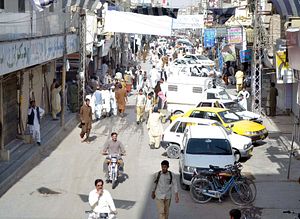A few months ago, the leader of an outlawed Baloch separatist party hinted that “If our friends, companions, political allies and finally the people are in favor of this [reconciliation with Pakistan], then we are definitely ready to live with Pakistan.”
Pakistan has faced the Baloch rebellion since its inception. Insurgency in Balochistan has evolved over the decades. The largest uprising took place between 1973 and 1997 with some 80,000 Pakistani troops deployed in the province. Following the death of Nawaz Akbar Khan Bugti in August 2006, the movement surged again.
The movement has died down recently, with many self exiled Baloch separatist leaders toning down their independence rhetoric and asking their followers to consider the reconciliation approach towards their state. Brahamdagh Bugti, leader of the Balochistan Republican Party (BRP) – a separatist party – in a recent statement said that he is heading a democratic party and believes in dispute resolution through dialogue.
Arguably, part of this has to do with the growing economic activity in Balochistan, which irrespective of all negativity, is assured to bring economic prosperity to one of the least developed economic regions of the country. Perhaps economic gains have convinced both the Baloch separatist leaders and the state to rethink their mutual hard-line approach towards each other as the China-Pakistan Economic Corridor cannot become a success story unless there is peace and stability in this region.
Pakistan has reached out to many separatist leaders through backdoor channels and through direct overtures. The approach has been successful: in recent months, hundreds of militants have voluntarily surrendered because of the government’s newly adopted reconciliation approach, which guarantees amnesty from prosecution and among other rewards.
Baloch separatist leaders, while sensing CPEC as an opening to redeem their political and economic grievances, have realized that insurgency is not a solution to Balochistan’s chronic problems, which largely stem from its historically neglected economy.
After the announcement of the CPEC projects, the need for peace and reconciliation in the restive region has become a priority for both the Pakistani government and Baloch leaders. Balochistan is a strategically vital part of the Economic Corridor: Gwadar port, the pivot of this entire project, is located on the Persian Gulf, in close proximity to the Strait of Hormuz, which is a transit point for 40 percent of the world oil.
While it’s important to engage tribal leaders in dialogue, Pakistan should steer its reconciliation efforts towards the common people, who are the primary victims of underdevelopment and militancy in the region. Recently, the Chinese ambassador to Pakistan, Sun Weidong, in a statement said that Balochistan would be the “major beneficiary” of the multi-billion dollar economic development project which would “bring an end to unemployment” in the province.
Besides the state’s security-oriented policies towards the region, inter-tribal rivalries for resources and the condescending attitude of tribal leaders toward ordinary Baloch citizens have greatly impacted the region’s economic and political development.
Historically, Baloch tribal leaders, including the separatists, on different occasions have allied with the state, only to eventually become alienated. Disunity among tribal leaders and their apathy and indifference towards the needs of the population has further aggravated security situation in the province. “I feel that even if Baluchistan were liberated, infighting and killing would continue – unless Baloch leaders resolve their differences,” the BRP chief was noted as saying recently.
On a regional level, India is wary about the Chinese-funded economic corridor in Pakistan. Among other concerns, New Delhi fears that Beijing may use Gwadar port for military purposes. Pakistan’s military is going to increase its presence there as well, to protect Chinese workers. Balochistan additionally sits next to Afghanistan. Islamabad alleges that New Delhi uses Afghanistan to foment instability in Balochistan.
India’s proactive involvement in Afghanistan, especially close to the Pakistan border, definitely inflames Pakistani sensitivities. The claim is not without historical justification as Pakistan has been dismembered before and that too with the help of Indian intervention. The case of Bangladesh certainly provides a clear warning and, the memories of 1971 still fresh, Pakistan views territorial integrity with the utmost seriousness and is acutely aware of those countries that allegedly support sub-national groups within its borders.
The Pakistani state’s policy change towards Balochistan is already evident. There are talks of improving people’s lives by directing the dividends of Chinese investment into the region. Given the current security situation, while a military presence is essential to keeping peace and stability in Balochistan, lasting peace and security will only come through economic prosperity and development, which CPEC certainly promises.

































